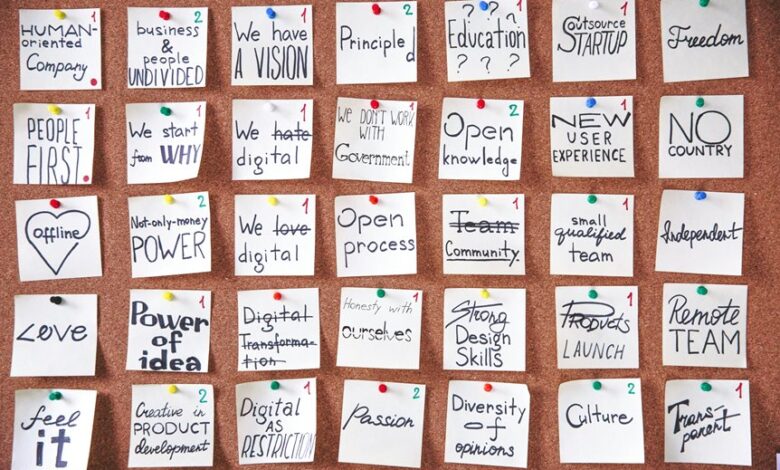Developing Organizational Culture 3512414421

Developing organizational culture is a multifaceted process that requires careful consideration of core values and employee dynamics. Organizations must strategically engage their workforce to foster a sense of belonging and purpose. Effective leadership and open communication play crucial roles in this endeavor. However, the true challenge lies in sustaining these cultural enhancements over time. What methods can be employed to ensure that these values are not only adopted but actively practiced within the organization?
Understanding Organizational Culture
Understanding organizational culture requires a careful examination of the values, beliefs, and behaviors that shape the environment within an organization.
Analyzing cultural dimensions reveals underlying behavior patterns that influence interactions and decision-making processes. Such insights foster collaboration and strategic alignment, empowering individuals to navigate complexities.
The Importance of Core Values
Core values serve as the foundational principles that guide an organization’s actions and decisions, deeply intertwined with its culture.
They foster core value alignment, ensuring that all members operate under a unified ethical framework. This alignment promotes ethical decision making, enabling organizations to navigate challenges with integrity.
Ultimately, a commitment to core values cultivates a collaborative atmosphere, empowering individuals to contribute freely and effectively.
Strategies for Building a Positive Culture
Effective leadership and open communication are essential components in fostering a positive organizational culture.
By implementing employee recognition programs, organizations can not only enhance morale but also reinforce core values.
These strategies create an environment that promotes collaboration and engagement among team members.
Leadership and Communication
While leadership and communication are often viewed as separate entities, their interplay is crucial for fostering a positive organizational culture.
Diverse leadership styles can effectively bridge communication barriers, enhancing collaboration and transparency. Leaders who prioritize open dialogue empower employees, encouraging a sense of ownership and freedom.
Employee Recognition Programs
Building on the foundation laid by strong leadership and effective communication, employee recognition programs play a significant role in shaping a positive organizational culture.
Implementing structured employee appreciation initiatives, such as recognition ceremonies, fosters collaboration and morale. These programs encourage individuals to thrive within a supportive environment, ultimately enhancing productivity and retention while promoting a collective sense of value and belonging.
Engaging Employees in the Cultural Development Process
Engaging employees in the cultural development process is pivotal for fostering a sense of ownership and alignment with organizational values.
Effective strategies for engagement not only enhance participation but also leverage diverse perspectives, ultimately leading to a more cohesive culture.
Importance of Employee Involvement
Employee involvement is crucial for fostering a robust organizational culture, as it not only enhances morale but also drives innovation and accountability.
Actively seeking employee feedback cultivates a sense of ownership, while promoting team collaboration encourages diverse perspectives.
This strategic engagement enables organizations to align cultural values with employee aspirations, ultimately creating a dynamic environment that supports growth and adaptability in an ever-changing landscape.
Strategies for Engagement
A culture that thrives on employee involvement must implement effective strategies for engagement to ensure that all members feel valued and heard in the cultural development process.
Emphasizing team collaboration fosters a sense of belonging, while robust feedback mechanisms empower employees to contribute meaningfully.
Measuring the Impact of Organizational Culture
While organizations often recognize the significance of culture in shaping performance, quantifying its impact presents a complex challenge.
Effective culture assessment requires aligning performance metrics with organizational values. By employing strategic frameworks, organizations can collaboratively measure cultural attributes, revealing insights into employee engagement and productivity.
This approach not only enhances accountability but also fosters an environment where individuals feel empowered to thrive.
Case Studies of Successful Cultural Transformation
Successful cultural transformation often emerges from organizations that have effectively measured and understood their existing culture.
Case studies reveal that strategic collaboration among leadership and employees fosters an environment conducive to change.
These organizations prioritize open communication and employee empowerment, resulting in enhanced engagement and innovation.
Conclusion
In conclusion, cultivating a vibrant organizational culture is akin to tending a flourishing garden, where the seeds of core values and shared beliefs blossom through collaboration and open communication. By actively involving employees in this nurturing process, organizations can forge a unified vision that aligns personal aspirations with collective goals. Regularly assessing the cultural landscape ensures that this garden remains resilient, fostering an environment ripe for innovation and engagement, ultimately yielding a harvest of empowered and motivated individuals.




